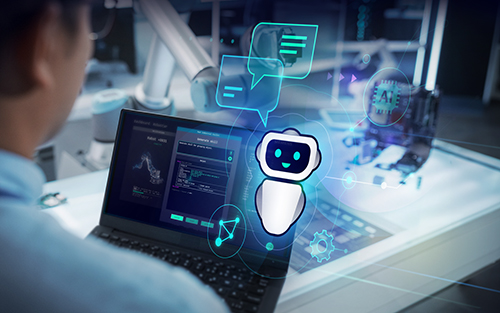- By Tali Segall
- July 25, 2025
- Siemens
- Feature
- Sponsored
Summary
Industrial Foundation Models are designed to understand the “language of engineering” and promote collaboration and innovation in manufacturing and production sectors.

Artificial intelligence is rapidly reshaping industry, offering new ways to bridge the gap between human expertise and machine efficiency. Yet, traditional AI models often struggle to meet the complexity, precision and safety requirements of industrial environments. A new approach is emerging: An Industrial Foundation Model, designed to understand the “language of engineering” and unlock new levels of collaboration and innovation across manufacturing and production sectors.
Understanding Industrial Foundation Models
Foundation models, trained on vast amounts of diverse data, have revolutionized how AI systems perform general tasks. An Industrial Foundation Model takes this concept further, tailoring AI to industrial contexts. Unlike consumer AI, which focuses on human conversation or image generation, an Industrial Foundation Model is built to comprehend engineering principles, physical laws, technical documentation and operational data.
This model is not just another layer of automation. It offers a fundamental shift: machines that can understand complex industrial environments, reason about physical systems and assist engineers across all stages of the product lifecycle—from design and planning to production and maintenance.

Why industry needs specialized AI
While general-purpose AI has achieved impressive results in areas like customer service and entertainment, it falls short in industrial settings. Manufacturing systems operate with tight tolerances, strict safety standards and massive amounts of specialized knowledge. Misunderstandings or inaccuracies are not just inconvenient—they can lead to costly downtimes or even hazardous failures.
An Industrial Foundation Model aims to overcome these gaps. By embedding domain-specific expertise directly into the AI, it enables a more natural interaction between human engineers and machines. Engineers can use these models to validate designs, optimize production processes, predict maintenance needs and adapt operations dynamically—all while trusting the AI to “think” in ways consistent with engineering logic.

Key applications of Industrial Foundation Models
- Design and simulation: AI can analyze complex engineering designs, suggest optimizations and predict system behaviors under different conditions. This accelerates the innovation cycle and reduces costly errors early in development.
- Production optimization: An Industrial Foundation Model enables real-time process adjustments, energy efficiency improvements and predictive analytics that optimize manufacturing performance without requiring constant manual oversight.
- Maintenance and service: By continuously learning from sensor data, maintenance logs and historical performance, an Industrial Foundation Model supports predictive maintenance strategies. It helps detect early warning signs of wear, recommend interventions, and schedule service to minimize disruption.
- Human-machine collaboration: Rather than replacing human expertise, an Industrial Foundation Model enhances it. Engineers and operators can query the system using natural language or technical terminology and receive actionable insights grounded in industrial realities.
The challenges ahead
Building an effective Industrial Foundation Model is no simple task. Unlike generic AI, these systems must:
- Handle specialized, technical language across multiple engineering disciplines.
- Be trained by diverse data types, from CAD models and schematics to real-time IoT sensor streams.
- Respect strict safety, reliability and regulatory standards.
- Maintain explainability and transparency, so human users can understand AI decisions.
This demands not only deep technical expertise but also close collaboration between AI researchers, industry experts and operational teams. Industrial AI solutions like the Siemens Copilot for Engineering greatly benefit from an Industrial Foundation Model.
Toward a new industrial era
The promise of an Industrial Foundation Model is clear: smarter, safer and more flexible manufacturing environments. Companies that successfully integrate this technology can expect faster innovation cycles, reduced costs and improved productivity.
Moreover, as these models continue to evolve, they will support entirely new forms of human-machine interaction. Imagine engineers co-creating designs with AI partners that deeply understand not only what is possible but also what is practical and efficient in a real-world factory.
A collective effort
Building an Industrial Foundation Model is not a task any single organization can tackle alone. It requires open collaboration across industries, sharing data, knowledge and best practices. At Siemens, we are working on developing an Industrial Foundation Model that will be taking AI in industry to the next level—and we invite our customers and partners to join us. Together, manufacturers, technology providers and research institutions can shape a future where AI doesn’t just automate tasks, but actively contributes to solving humanity’s most complex engineering challenges.
In this way, an Industrial Foundation Model represents more than a technological advance. It offers a blueprint for a more intelligent, resilient and sustainable industrial future—one where humans and machines work hand-in-hand, each enhancing the capabilities of the other.
About The Author
 Tali Segall is the Lead Industrial Foundation Model at Siemens. She is passionate about fostering open innovation and works to drive innovation performance and empower intrapreneurs. Tali is a seasoned executive with vast experience in building a product vision and strategy.
Tali Segall is the Lead Industrial Foundation Model at Siemens. She is passionate about fostering open innovation and works to drive innovation performance and empower intrapreneurs. Tali is a seasoned executive with vast experience in building a product vision and strategy.
Did you enjoy this great article?
Check out our free e-newsletters to read more great articles..
Subscribe

